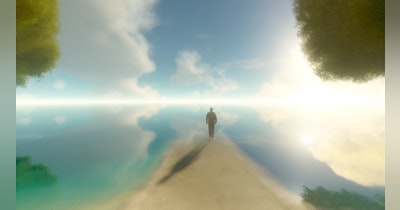For a couple of months now I've been somewhat obsessed with the problem of free will – both in general and in Stoicism. Stoicism is a philosophy all about choices, we choose in accordance with our character, but some Stoic texts also say things like this (according to Cicero)
"Chrysippus describes a cylinder and spinning-top which cannot begin to move unless they are pushed or struck, when this has happened, they continue to move due to their own nature, the cylinder rolling forward and the top spinning round.
As a person who has pushed a cylinder forward has given it a beginning of motion, but has not given it it's shape to roll. So a sense-presentation will impress a seal of its appearance on the mind, but the act of assent will be in our power, and as we said in the case of the cylinder, though given an initial push, as to the rest, it will move by its own nature."
– Cicero, On Fate 42-43
Which suggests that while fate might determine that we roll, it won't determine how we roll – only our shape (our character) can determine that.
But then what determines our shape?
The answer is our choices. But how do we make our choices? Based on what has happened to us. But what controls what happens to us? The web of causality. Isn't that fate? Yes.
So we're back at square one.
Chrysippus also says,
"The non-destruction of one's coat, he [Chrysippus] says, is not fated simply, but co-fated with its being taken care of, and someone's being saved from his enemies is co-fated with his fleeing those enemies; and having children is co-fated with being willing to lie with a woman. ... For many things cannot occur without our being willing and indeed contributing a most strenuous eagerness and zeal for these things, since, he says, it was fated for these things to occur in conjunction with this personal effort. ... But it will be in our power, he says, with what is in our power being included in fate."
– Eusebius, Praeparatio Evangelica, Book 6
But there's the same problem with the idea of co-fated-ness:
What determines whether we care? Our character? What determines our character? Our choices? What determines our choices? The things that have happened to us. What determines those things? Fate.
It seems we can't have free will if we have Causality
This should be obvious. It should also be frustrating to any Stoic who is learning to make appropriate choices because it would seem to suggest that no one has any control over their choices. Their choices are determined by the shape of their character, which is determined by what has happened to them, which is determined by causes, which is fatalistic.
In other words, when the big bang happened, and earth was formed some billions of years later, and then single-cell organisms, then multi-celled organisms, then human beings, etc. The causal chain was created at the very beginning and can only result in one ultimate outcome and nothing can do anything about it.
Living things that can't consciously choose can't do anything to disrupt this causal chain because they can't choose.
Living things that can consciously choose can't do anything to disrupt this causal chain because any choice they make is determined by their character, which is determined by the things that happen to them, which is determined by the causal chain.
No matter how complex the living thing (or how many times removed from the causal chain it might seem to be), everything it does can be traced to the first event that happened to it, which can be traced to the first event that ever happened.
So, then, how can we have truly free will? Even if we limited the definition of free will to "freedom of the hegemonikon" or "freedom to choose our own thoughts, attitudes, and actions"?
It would seem that we cannot.
But is Causality even real?
This might seem an insane question to ask because of course it is, right? If I hit a baseball with a baseball bat and it flies into the air, where it lands is going to be the result of a number of causes – that's Causality, right?
No.
Causality, capital "C", is the principle that everything has a cause.
causality, lower-case "c", is the relationship between cause an effect.
The baseball bat and the baseball is an example of causality, but what we've been discussing up to now is Causality: that everything has a cause and that all these causes are antecedent in nature (even if strung together in a vast and complicated web that makes it impossible to trace them all).
So, I ask again, is Causality even real?
I say it is limited in its realness.
In a similar way to how General Relativity and Quantum Mechanics are both true but seem impossibly incompatible, I believe the same between what I will call "Space Time Causality" and "Human Causal Interdependence".
Or maybe this is what I believe – I'm thinking as I write, none of this is planned.
When it comes to inanimate objects and living things which lack Reason and the ability to choose, I believe Causality is a sound theory.
When it comes to living things which possess Reason and the ability to choose, I believe Causality breaks down (albeit not completely).
Limited Causality
It is of course the case that Space Time Causality will provide the landscape and conditions within which anything exists. So the physical world around us is the terrarium we've been "put" in and which was created by Space Time Causality, this will, of course, impact us in some ways.
As an example:
If I'm juggling rocks because rocks are the only things available to juggle, part of why I'm juggling rocks is because they're the only things available to juggle.
Part of my decision to juggle rocks, then, was determined by the Space Time Causality.
But my decision to juggle at all, was not.
My decision to juggle at all was determined by Human Causal Interdependence (and I know this is a wonky label but bear with me, remember: thinking as I write).
Interdependent upon what?
Interdependent upon Space Time Causality and Reason and Character
We make the choices we make because Space Time Causality presents us with canvas and material, Reason provides us with consideration and an ability to choose, and Character provides us with a preference or leaning.
To make this make sense I think I have to work backwards, or in a zigzag. Probably the latter.
Where does our character come from, in my estimation? It comes from our ability to Reason and the habituation of choices we make through our Reason.
I believe we have no character until we have the ability to Reason.
Where does our ability to Reason come from? From the biological processes which are a result of Space-Time Causality (Space Time Causality is entirely responsible for everything leading up to Reason-present consciousness).
Our character is prone toward certain behavior and choices, because prior behaviors and choices have been habituated – which has resulted in a sort of cognitive preloading.
But this begs a causality dilemma of sorts...
Which came first, the choice or the character?
The answer is neither. Just like the answer to "which came first, the chicken or the egg?" is neither. The proto-chicken came first, and it laid an egg that contained the first biologically modern chicken. Proto-decisions came first, and the last of these were had when the biological processes I mentioned earlier brought about consciousness and the ability to reason in the human being.
If human beings are "rational animals" (animals that can reason), then we are some sort of non-human (in that we possess no Reason) until a point in the process of human development is reached (very likely the number of neurons in our brains) and we gain the ability to reason and choose.
These first choices are primitive, strongly influenced by externals, but nonetheless they begin to immediately shape a character. Our character.
It is not until a much older age that we gain a resilience to the externals that influence our choices and this is where we begin to shape our own character entirely on our own. Though, in truth, there must be a fair amount of time where where our control is not yet greater than the control of externals.
But I think we eventually lose the ability to shape our character
This might be going a bit too far into the deep end but I think, just as we are at the whim of externals when we're in our proto-choices stage, once we habituate our thoughts, actions, and attitudes (choices) to a great enough degree, we are a prisoner of our character and unable to any longer change it.
The window of time during which we have the ability to shape our character may be only a few decades (that's my intuition anyway), but it is certainly there.
Our birth is the result of causality, and we are trapped until we are awakened by Reason. But we are only in this awakened state until we've so strongly habituated our character that we lose our ability to authentically reason. Then we are trapped by our character.
What do I mean by "trapped by our character"?
The Stoics say that a sage cannot stop being a sage, because a sage would never make choices that weren't virtuous. This suggests that once sagehood is achieved it becomes impossible to choose your way out of it because you become unable to make choices that aren't virtuous.
I'm extrapolating from that idea this theory: once a character is habituated, it cannot be unhabituated. If it's true of the sage, it must also be true of the sage's polar opposite; and of everything in between. Once you've habituated your character through too many choices, you might cross beyond the point of no return. So, for better or worse, there's a limited window wherein you set the direction you continue in until your death.
Those are just my thoughts and opinions.









